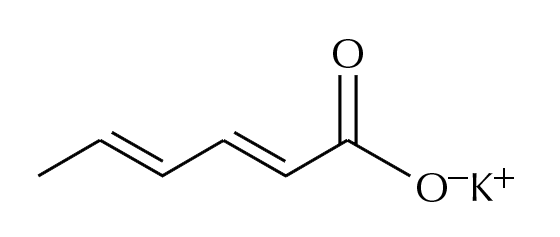What Is Potassium Sorbate?
Potassium sorbate is a mild preservative that is used in skincare, cosmetics, and body care formulations. It is used to extend the shelf-life of your products by preventing the growth of bacteria, fungi, and molds. It is also used as an alternative to parabens.
Potassium sorbate is the potassium salt of sorbic acid. Sorbic acid is a natural compound found in berries of the mountain ash tree or Sorbus aucuparia. While natural sources of this ingredient exist, nearly all of the world’s production of sorbic acid is manufactured synthetically. Synthetic production of ingredients and chemicals is often looked upon as a bad thing, particularly in the green or natural beauty industry. However, synthetic manufacturing is actually more sustainable for the environment as it doesn’t deplete natural resources.
Potassium sorbate is produced industrially by neutralizing sorbic acid with another ingredient, potassium hydroxide. This synthetic version is a nature-identical compound. Nature identical means that the chemical that has been produced synthetically has the same function and structure of the molecule found in nature. Due to patents, some synthetic chemicals have to be altered slightly in order to avoid impinging on another company’s patent. This slight change usually has no effect on the function; however, in some cases, these changes can have unintended side effects. In the case of potassium sorbate, it is nature-identical, eliminating this risk.
Potassium sorbate occurs as a white crystalline powder, white granules, or pellets. It readily dissolves in the water where it converts to sorbic acid, its active form.
Sorbic acid is very pH-dependent. In chemistry, pH stands for ‘potential hydrogen’ and it refers to the level of acidity or alkalinity in a given solution. The pH scale ranges from 0 to 14. A pH of 7 is neutral, while a pH less than 7 is acidic and a pH greater than 7 is basic. Sorbic acid demonstrates some activity up to pH 6 (about 6%), but it is most active at pH 4.4 (70%). Keeping in mind that the skin’s natural pH is between 4.7-5.75.
12 Skincare Ingredients You May Want to Avoid

Potassium Sorbate
the good:Potassium sorbate is used as a preservative to maintain the stability of your skincare products and increase their shelf life. Preservatives help to reduce the growth of bacteria, fungi, and molds in your skincare products.
the not so good:Although it is rare, some people can have an allergy to potassium sorbate.
Who is it for?All skin types except those that have an identified allergy to it.
Synergetic ingredients:Works well with most ingredients .
Keep an eye on:Nothing to keep an eye on here.
Is Potassium Sorbate Safe?
The Food and Drug Administration (FDA) reviewed the safety of potassium sorbate and determined that this ingredient is Generally Recognized As Safe (GRAS) as a preservative for direct addition to food. Potassium sorbate is mainly used as a food additive but can also be used in cosmetics and skincare products.
The safety of potassium sorbate has been assessed by the Cosmetic Ingredient Review (CIR) Expert Panel. The CIR Expert Panel evaluated the scientific data and concluded that potassium sorbate was safe for use in cosmetics and personal care products.
The research was conducted using a concentrated solution of potassium sorbate, 10%. This concentration is much higher than the concentrations used in cosmetic products, most cosmetics and skincare products contain 1%. At this higher concentration, potassium sorbate was non-irritating to the eye and was only slightly irritating to the skin. In 2006, as part of the scheduled re-evaluation of ingredients, the CIR Expert Panel considered available new data on these ingredients and reaffirmed the above conclusion.
What Does Potassium Sorbate Do?
Potassium sorbate is predominantly used as a food preservative. It inhibits the growth of molds and yeasts in many foods, such as cheese, wine, yogurt, dried meats, soft drinks, and baked goods.
These same preservative properties can be used to extend the shelf-life of cosmetics and personal care products. While potassium sorbate is effective against fungi, mold, and yeast, it is less active against bacteria. Therefore, potassium sorbate is not considered a broad-spectrum preservative and it must be used in conjunction with other preservatives to ensure formulas are protected.
Preservatives have received a negative connotation in the cosmetic and skincare industry because of claims that preservatives are hazardous to health. This is why many organic and natural beauty brands often include ‘preservative free’ claims on product labels. However, the use of preservatives is necessary for most products to prevent degradation caused by microorganisms, and to protect the product from inadvertent contamination during use.
A preservative may also be added to a product to protect it against deterioration caused by exposure to oxygen. In this case, these ingredients are also called antioxidants. Just like food, cosmetics products can become contaminated without preservatives, leading to product spoilage and possibly irritation or infections. Microbial contamination of products, especially those used around the eyes and on the skin, can lead to significant complications. Preservatives help prevent such problems.
References:
Timmer, C, 2000. Antimicrobials and Disinfectants. In: Kanerva, L, Wahlberg, J, Elsner, P & Maibach, Handbook of Occupational Dermatology, Springer, Berlin, Heidelberg. Cosmetic Ingredient Review, 1988. ‘Final Report on the Safety of Sorbic Acid and Potassium Sorbate’, Journal of The American College of Toxicology, vol. 7, no. 6.







